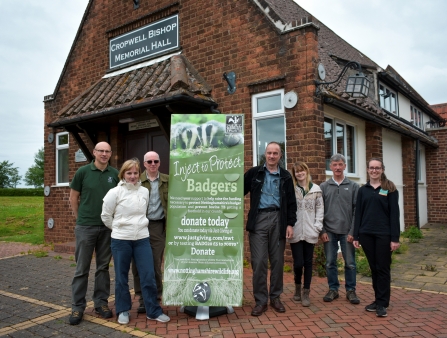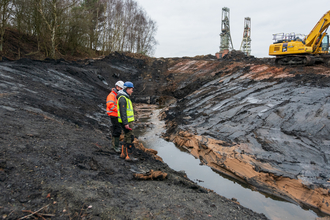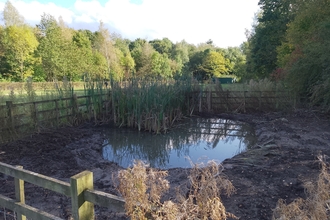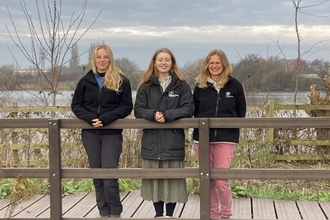
Gary Cragg - left - with members of Nottinghamshire Wildlife Trusts Badger Vaccination Team at a recent training session

Gary Cragg - left - with members of Nottinghamshire Wildlife Trusts Badger Vaccination Team at a recent training session
Nottinghamshire Wildlife Trust, the county’s largest locally based conservation charity, is set to resume vaccinating badgers against bovine tuberculosis (bovine TB) in the next few weeks thanks to the backing of a four-year grant from DEFRA. The charity has welcomed the support of DEFRA and will be delighted to resume the work it originally started back in 2015.
Last year the Wildlife Trust carried out vaccinations at 20 separate setts across 10 farms and the new funding will enable efforts to control the disease, which can devastate dairy and beef farming businesses, to reach even more of a 50 square kilometre project area on the Nottinghamshire / Leicestershire border. Bovine TB is spread in several ways, primarily through contact between cows, but there is the potential for it to move through badger populations, and so vaccination of badgers is an important part of the range of measures necessary to control this disease.
In preparation for the new season of vaccinations 15 staff and volunteers attended special briefing days last month and the vaccination work will begin just as new rules relating to culling badgers come into effect.
Speaking about the project Nottinghamshire Wildlife Trust’s Head of Conversation, Janice Bradley said
This work is so important as it helps to reduce the risks posed to farm businesses and enables us to keep the charismatic badger in this wonderful pastoral landscape by building up herd immunity in the local badger population and helping to contain this devastating disease. Whilst it is possible that badger culling could be extended into Nottinghamshire in the future, this could only take place around ‘hot spots’ where the disease has taken hold in both cattle and badgers, which is not currently the case. We are determined to reduce the chance of outbreaks by making sure that badgers are unable to either become infected or spread infection – so our work is vital to preventing future culls of badgers locally.”Janice Bradley
Janice continued: “By working closely with local landowners we have built up a unique knowledge of the local badger population and we can now use this knowledge to help protect both livestock and wild badgers. By working closely with farmers we are also learning more about the other wildlife that their farms support.”
© Gary Cragg
The project area includes important dairy and beef farming businesses and the long history of milk production in the area to produce the world famous Stilton cheese has helped to shape the local landscape with its characteristic rolling green pastures. In addition to being attractive and much loved, this landscape supports a wide variety of wildlife in addition to badgers, with many species of farmland birds, such as yellowhammers and grey partridge, and small mammals thriving in the hedgerows and a great diversity of invertebrates living in the pastures.
The project area stretches from Cropwell Bishop to Wartnaby with approximately 25% of the area covered falling in Leicestershire. Last year the area was extended to include Wartnaby and this year will include Holwell for the first time.
© Gary Cragg
The Wildlife Trusts have been at the forefront of efforts to develop effective vaccination programmes across England and believes that vaccination provides a more effective means of controlling the spread of the disease than culling. The Trust has been delighted by the levels of support received from farmers willing to provide access to their land and make a contribution towards the cost of vaccination.
Janice added: “There have been a number of local herd breakdowns in the past and if bovine TB were to get a hold here it could have a devastating impact on the dairy and beef industry. Some farmers may even choose to move away from the dairy business altogether and this could be a disaster for the farmers, the local landscape and the local badger population - so we’re determined to work with farmers to play our part in keeping it at bay.“
Speaking following the training days held in Cropwell Bishop new Project Manager Gary Cragg said:
The support of volunteers is key to the success of this project and we have a really enthusiastic and dedicated team. The recent training days were a good opportunity for everyone to get together ahead of the busy vaccination season aheadGary Cragg
Vaccinations will recommence in May when badger cubs have finished weaning. Whilst much of the cost of the programme will be covered by the DEFRA grant, Nottinghamshire Wildlife Trust must raise around £8000 in match funding donations from the public each year to cover all its costs.
The Trust is keen to hear from anyone interested in sponsoring or supporting the 2018 vaccination programme and individual donations can be made via the Trust’s Just Giving page www.justgiving.com/nwt or texting BADG20 £5 to 70070.
For further details about this news release please call Erin McDaid on 0115 958 8242 or 07734 573862 or email emcdaid@nottswt.co.uk

Nottinghamshire Wildlife Trust is delighted to announce the reinstatement of flowing river water along a key section of Vicar Water at…

Nottinghamshire Wildlife Trust celebrates unprecedented levels of habitat creation and restoration across Nottinghamshire and highlights…

Nottinghamshire Wildlife Trust is excited for the year ahead as partnership looking to boost recovery of wildlife in the Trent Valley…